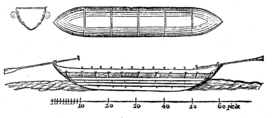A chaika (Ukrainian: чайка, chayka, Hungarian: csajka, Polish: czajka, Serbian: шајка / šajka, Slovene: šajka or plitka) was a wooden boat that could have a mast and sail, a type of galley, used in early modern warfare and cargo transport by the:
- Zaporozhian Cossacks in the 16th–17th centuries in Ukraine on the Dnipro River and the Black Sea.
- Serbs in the 16th-19th centuries on the Danube, known as Šajkaši, under the Kingdom of Hungary, Austrian Empire and Habsburgs.
- Slovenes from the 16th to the early 20th century on the Drava River.[1]
 Chaika boat (Beauplan's book "Description of Ukraine", 1660) | |
| Development | |
|---|---|
| Year | 1500s |
| Role | Marine warfare/transportation |
| Boat | |
| Crew | 50 or 60 |
| Draft | 4 m (13 ft) (board down) |
| Hull | |
| Type | Monohull |
| Construction | Wood |
| LOA | 20 m (66 ft) |
| Beam | 3.5 m (11 ft) |

Types
editAustrian
editTschaika were either 24 m (79 ft) (Ganz ("Full") Tschaika) or 12 m (39 ft) (Halb ("Half") Tschaika) in length, operated by sail or oars. Between 30 and 50 men were in service, commanded by an officer, with a helmsman, an armourer, a drummer, two bowsmen, and up to 36 oarsmen.[2]
Zaporizhian Host (Ukraine)
editChaikas were between 18–20 m (59–66 ft) in length, 3–3.5 m (9.8–11.5 ft) in width, and 3.5–4 m (11–13 ft) in depth. The bottom of a chaika was carved out of a single tree trunk, with sides built out of wooden planks. To protect the boat from enemy guns or from sinking, reed bales were tied to the gunwales of the boat. One such boat could carry around 50 to 60 men and up to 6 falconets (small cannon). Some chaikas also had two steering oars, so that the boat never needed turning around in order to switch direction.[citation needed]
A similar, but larger boat used by the Zaporozhian Cossacks for both transport and warfare was called a baidak.
References
edit- ^ Baš, Angelos (2003). "Šajkarstvo na Slovenskem". Traditiones (in Slovenian and English). 32 (1). COBISS 21585965.
- ^ Hollins, p. 11
External links
edit- The Viking "drakkar" and the Kozak "chaika" Archived 2020-11-01 at the Wayback Machine
- Media related to Chaika (boat) at Wikimedia Commons